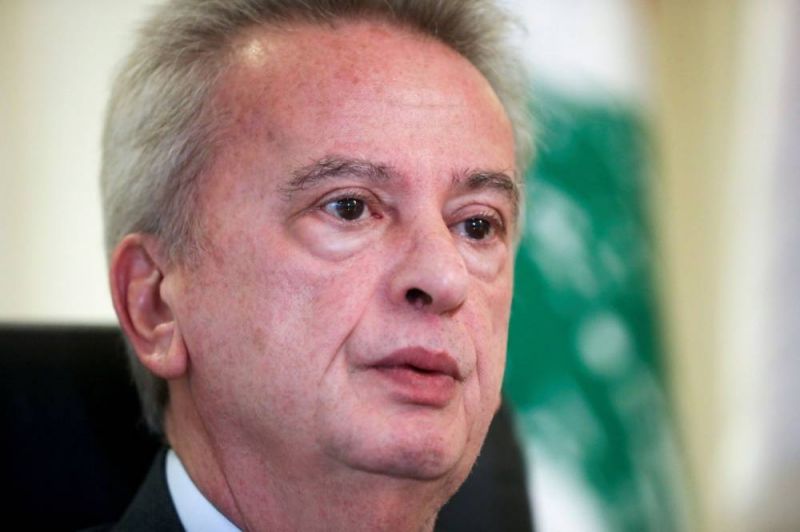
Central bank Governor Riad Salameh speaks during an interview for Reuters Next conference, in Beirut on Nov. 23, 2021. (Credit: Mohamed Azakir/Reuters)
Want to get the Morning Brief by email? Click here to sign up.
Lebanon’s central bank failed to disclose the recipients of commissions it collected, which included its governor Riad Salameh’s brother. For over a decade, Lebanon’s central bank collected commissions from commercial banks without clarifying that most of those fees ended up at a company controlled by the brother of the central bank governor, four contracts seen by Reuters revealed. The contracts, dated from 2004 to 2014, show that a Lebanese commercial bank agreed to pay three-eighths of 1 percent commission on purchases of government certificates of deposit, worth millions of dollars. The commissions are being investigated in Europe and Lebanon; Swiss authorities suspect the Salameh brothers may have embezzled more than $300 million from Banque du Liban in a similar fashion between 2002 and 2015. Salameh, who many hold responsible for engineering Lebanon’s financial meltdown, is currently involved in an ongoing game of cat-and-mouse with Mount Lebanon Public Prosecutor Judge Ghada Aoun. In her latest attempt to hold him accountable, Aoun charged the director-general of the Internal Security Forces, Maj. Gen. Imad Othman, with obstructing the implementation of a judicial warrant after the ISF was accused of hampering State Security’s efforts to detain Salameh.
Parliament yesterday approved the extension of a law that lifts banking secrecy on public accounts to facilitate a forensic audit on the country’s central bank. Although the law was not originally included on Parliament’s agenda for the session, Free Patriotic Movement MP and head of Parliament’s Finance and Budget Committee Ibrahim Kanaan requested it be added at the beginning of the meeting. The Lebanese government has twice signed contracts with the firm Alvarez & Marsal to audit BDL’s accounts. The firm canceled the first contract due to BDL’s failure to provide the necessary documents to complete the audit. Although the second contract was signed in September 2021, the financial audit remains up in the air. During yesterday’s session, Parliament also sent a law that includes a proposal to prevent interference in the judicial system back to the parliamentary committees for further discussion and approved a draft law on the provisional twelfth rule spending, which allows the government to spend the equivalent of one-twelfth of the budget provided for in the previous year's finance law. However, not all the laws on Parliament’s agenda yesterday were addressed. For example, a controversial law that would allow municipalities to grant exceptional building permits, circumventing the permitting process, went undiscussed.
Lebanon’s monthly consumer price index recorded its highest year-on-year increase, up 239.68 percent compared to January 2021, since the start of the country’s economic crisis. However, on a monthly basis it has slowed down to a single-digit increase of 7.69 percent compared to December’s 16.53 percent increase. All major consumer categories showed a monthly increase, except for “clothing and footwear” which dropped 1.09 percent. The report also shows a 68.68 percent increase in the price of “miscellaneous goods and services,” which include personal care products such as perfumes, toothpaste, hairdresser services, makeup and insurance services. The effects of the US dollar-to-lira exchange rate stabilization, which now hovers around LL20,000 to LL21,000, is expected to lead to lower a month-over-month inflation reading in the February report.
The investigation into the port explosion has been suspended for the fifth time. The latest halt comes after MPs and former ministers Ghazi Zeaiter and Ali Hassan Khalil yesterday filed yet another case in the matter. Zeaiter and Khalil seek to depose the head of the Court of Cassation Judge Naji Eid from ruling on a complaint filed against Judge Tarek Bitar, the head of the Aug. 4, 2020 Beirut port blast investigation, a judicial source confirmed to L’Orient Today. Last Tuesday, Civil Court of Cassation Judge Rola Masri sent back a previous appeal to remove Judge Eid and his advisor Rosine Ghantous from ruling on the case.
Border tensions flared up again as an Israeli “military boat violated the Lebanese maritime borders near Ras al-Naqoura” in South Lebanon, according to the Lebanese Army. In a statement, the Army stated that the vessel infiltrated Lebanese coastal waters for 50 minutes, hovering at a distance of 407 meters. This international violation comes on the heels of numerous violations of Lebanese territories by Israel, which on Friday entered Lebanese airspace at such a low altitude that it caused momentary panic among the residents of Beirut and its surrounding areas. A day earlier, the Israeli army claimed it had shot down a drone belonging to Hezbollah.
The Lebanese Army foiled an attempt to smuggle some 200,000 captagon pills from Syria into Lebanon aboard a motorcycle. The individual who was transporting the pills on Sunday through Wadi Oueini, a region on the outskirts of Arsal, managed to flee, leaving his valuable cargo behind. The Army said in a statement that a search for the fugitive is still underway. This is the fourth major captagon bust in less than a week: On Friday, the ISF seized 700,000 captagon pills headed for Riyadh a few hours after it had confiscated thousands of such pills in Tripoli bound for Africa. Two days earlier, the Lebanese Army had arrested suspects on a mini-bus loaded with captagon.
In case you missed it, here’s our must-read story from yesterday: “Contracts show Lebanon's central bank obscured recipients of commissions”